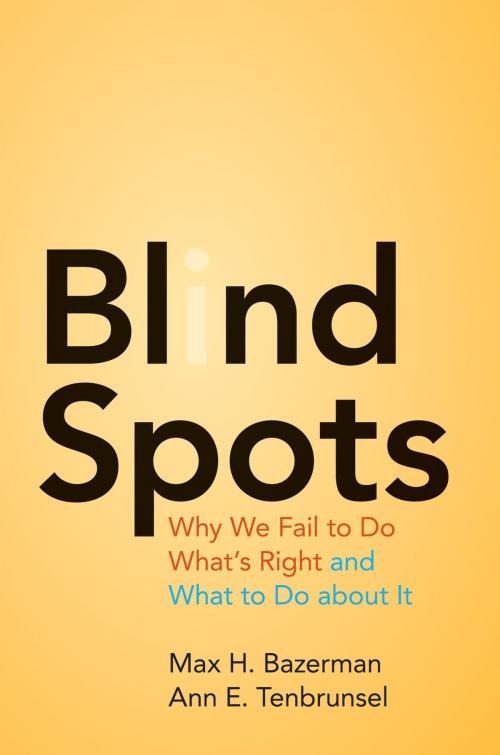Blind Spots
Why We Fail to Do What's Right and What to Do about It
Business & Finance, Business Reference, Business Ethics, Nonfiction, Health & Well Being, Psychology, Applied Psychology| Author: | Max H. Bazerman, Ann E. Tenbrunsel | ISBN: | 9781400837991 |
| Publisher: | Princeton University Press | Publication: | March 1, 2011 |
| Imprint: | Princeton University Press | Language: | English |
| Author: | Max H. Bazerman, Ann E. Tenbrunsel |
| ISBN: | 9781400837991 |
| Publisher: | Princeton University Press |
| Publication: | March 1, 2011 |
| Imprint: | Princeton University Press |
| Language: | English |
When confronted with an ethical dilemma, most of us like to think we would stand up for our principles. But we are not as ethical as we think we are. In Blind Spots, leading business ethicists Max Bazerman and Ann Tenbrunsel examine the ways we overestimate our ability to do what is right and how we act unethically without meaning to. From the collapse of Enron and corruption in the tobacco industry, to sales of the defective Ford Pinto, the downfall of Bernard Madoff, and the Challenger space shuttle disaster, the authors investigate the nature of ethical failures in the business world and beyond, and illustrate how we can become more ethical, bridging the gap between who we are and who we want to be.
Explaining why traditional approaches to ethics don't work, the book considers how blind spots like ethical fading--the removal of ethics from the decision--making process--have led to tragedies and scandals such as the Challenger space shuttle disaster, steroid use in Major League Baseball, the crash in the financial markets, and the energy crisis. The authors demonstrate how ethical standards shift, how we neglect to notice and act on the unethical behavior of others, and how compliance initiatives can actually promote unethical behavior. They argue that scandals will continue to emerge unless such approaches take into account the psychology of individuals faced with ethical dilemmas. Distinguishing our "should self" (the person who knows what is correct) from our "want self" (the person who ends up making decisions), the authors point out ethical sinkholes that create questionable actions.
Suggesting innovative individual and group tactics for improving human judgment, Blind Spots shows us how to secure a place for ethics in our workplaces, institutions, and daily lives.
When confronted with an ethical dilemma, most of us like to think we would stand up for our principles. But we are not as ethical as we think we are. In Blind Spots, leading business ethicists Max Bazerman and Ann Tenbrunsel examine the ways we overestimate our ability to do what is right and how we act unethically without meaning to. From the collapse of Enron and corruption in the tobacco industry, to sales of the defective Ford Pinto, the downfall of Bernard Madoff, and the Challenger space shuttle disaster, the authors investigate the nature of ethical failures in the business world and beyond, and illustrate how we can become more ethical, bridging the gap between who we are and who we want to be.
Explaining why traditional approaches to ethics don't work, the book considers how blind spots like ethical fading--the removal of ethics from the decision--making process--have led to tragedies and scandals such as the Challenger space shuttle disaster, steroid use in Major League Baseball, the crash in the financial markets, and the energy crisis. The authors demonstrate how ethical standards shift, how we neglect to notice and act on the unethical behavior of others, and how compliance initiatives can actually promote unethical behavior. They argue that scandals will continue to emerge unless such approaches take into account the psychology of individuals faced with ethical dilemmas. Distinguishing our "should self" (the person who knows what is correct) from our "want self" (the person who ends up making decisions), the authors point out ethical sinkholes that create questionable actions.
Suggesting innovative individual and group tactics for improving human judgment, Blind Spots shows us how to secure a place for ethics in our workplaces, institutions, and daily lives.















